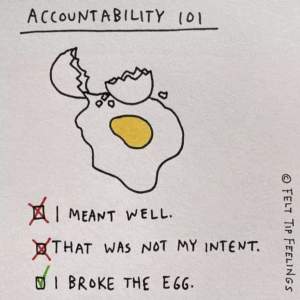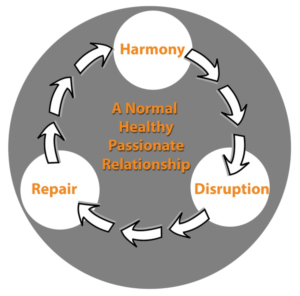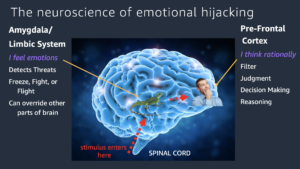Ok, so your partner is clearly upset with you. Maybe you know why, maybe you don’t. Hopefully you love them and want to make things better.
It’s important to note that conflict is normal in every relationship. We’ve all been there. What separates the great relationships from the not-so-great ones is how well that conflict is navigated. Now is your chance to steer your relation-SHIP from turbulent to calm waters.
Before we go into what to say, let me first mention that these recommendations might not work for all relationships, especially those with a narcissistic partner. The advice below assumes both partners mean well and want the best for the relationship. Those with narcissistic tendencies tend to manipulate a partner’s goodwill and make it seem like they are perennially the problem. If you think you might be in a borderline abusive or narcissistic relationship, reach out to a therapist as soon as possible.
Without further adieu, here we go:
“I’m sorry”
That’s right, it is time to suck it up and admit responsibility. Saying your sorry is one of the hardest things to do, because we all think that if we didn’t mean to hurt our partner, then we shouldn’t have to apologize. But we need to acknowledge the impact of our actions, rather than the intent.
If you meant to make an omelet but instead dropped an egg on the floor and your partner slipped on it before you had time to clean it up, you can still say that you are sorry that you performed an action that caused your partner pain.
 Harville Hendrix, the therapist and author who developed the Imago Relationship Therapy method, wrote that saying sorry communicates that you value your partner’s feelings and are willing to take responsibility for your actions. Even if you meant it or not. Apologizing effectively means acknowledging specifically what you’re sorry for, expressing regret without making excuses, and demonstrating a commitment to making amends.
Harville Hendrix, the therapist and author who developed the Imago Relationship Therapy method, wrote that saying sorry communicates that you value your partner’s feelings and are willing to take responsibility for your actions. Even if you meant it or not. Apologizing effectively means acknowledging specifically what you’re sorry for, expressing regret without making excuses, and demonstrating a commitment to making amends.
That making amends piece is key, which brings us into the next thing you might think about saying.
Is there anything I can do to move us toward repair?
The famous couples therapist Terry Real wrote that “Harmony, then disharmony, then repair is the essential rhythm of all close relationships.” If your partner is upset then you, that means you are at stage two: disharmony. Your job is to move the relationship back into repair.

Rather than getting defensive or trying to win the argument, seek to collaborate with your partner to find a mutually beneficial solution. You could also try any variation of:
- How can I make this right?
- What are you needing right now?
- What can I do for you?
When you do try to do concrete action to better the relationship, you might meet a potential stumbling block: your partner doesn’t want to you do anything, but understand something. In that case, you could try saying…
I see that you are upset. Can you help me understand?
In most relationship conflicts, partners just want to be heard and understood. They want empathy and shared understanding. They want to know that you are there for them.
You could try Thich Nhat Hanh’s famous mantra, “Darling, I know you’re suffering. That is why I am here for you.” Or perhaps the empathetic, “I hear you, I understand, and you are not alone.”

It is important to ask your partner about their thoughts and and feelings without sounding accusatory. If you ask them, “why in the world are you acting this way?” it will make them defensive and feel like they have to justify their beliefs. If instead you say, “I’m here to listen and learn. Tell me what you’re going through right now.”
Empathy says “I hear you, and I want to understand.” The relationship researcher John Gottman says we must attune to our partner’s emotional state. This involves active listening, asking empathetic questions, and summarizing their message. By validating your partner’s experience and showing a genuine desire to comprehend their point of view, you can start to build a foundation of mutual respect and trust.
If that doesn’t work, there is one final strategy you might try…
Can we cool off for a bit?
One final thing to note about emotional upset is that it has the potential to shut down our capacity for empathy and understanding. Many couples therapists recommend a “cooling off period” of 10-15 minutes to allow partners to regulate themselves in order to have a conversation.
If you feel like a break might help, definitely agree on a time to talk about the subject again. You don’t want to seem like you are avoiding the issue.

So you could say something like, “honey, I see that you’re upset, and I’m a bit upset too. I would love to talk about this issue and come to a resolution, but I feel we are both too emotionally charged right now. Can we take a short break and come back in half an hour? That would really help me better receive you.”
So there you have it, what to say when your partner is upset. Try it out, try it on, and see what works best for you.
If the conflict continues, you might need more professional help. Feel free to schedule a coaching session with me to get to the root of the issue.









